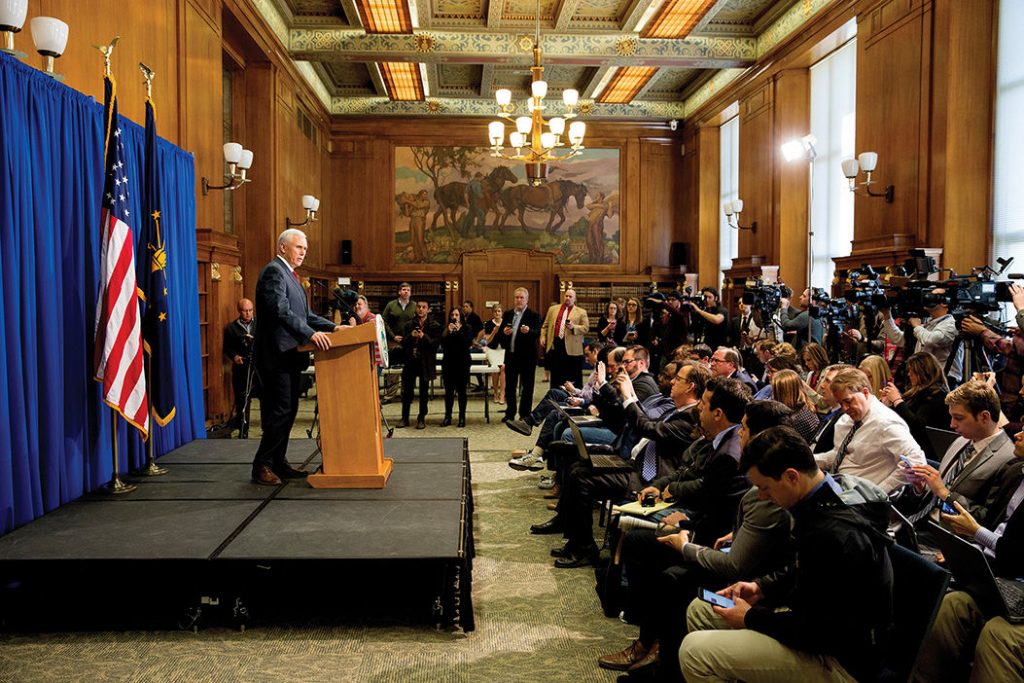Business boycotts, heated words and accusations sum up the backlash over the Religious Freedom Restoration Act, which was signed into law on March 26 by Republican governor of Indiana Mike Pence.
In response to the adverse reaction, Pence signed a revised version of the bill on April 2. In a statement made following the amendment, Pence said, “Last weekend I called upon the Indiana General Assembly to clarify that this new judicial standard would not create a license to discriminate or to deny services to any individual as its critics have alleged.”
The revised bill states that no “provider … may deny services to anyone on the basis of sexual orientation, race, religion or disability.” Despite this clarifying language, Pence admitted that some would still oppose the law, The Hill reports.
Critics of the bill had said that homosexuals would be discriminated against by Indiana businesses because of their sexual orientation, while advocates of the bill said that the bill simply ensures the religious freedom of individuals and businesses, while allowing those who disagree with certain business practices “to have their day in court.”
Since signing the bill, Pence has been on the defense, hosting press conferences and taking interviews in an attempt to mitigate the backlash. However, on March 29, in a back-and-forth on-air exchange with George Stephanopoulos, Pence declined to say “yes” or “no” as to whether the law would allow Christians to refuse wedding planning services to same-sex couples. Instead he repeated that the law was about the practice of religious freedom.
Pence said that no one would suffer discrimination. He stated in a press release, “If I thought [the bill] legalized discrimination in any way in Indiana, I would have vetoed it.”
Numerous other states have similar laws, with President Bill Clinton being the first to propose this type of law at the federal level in 1993. Stephanopoulos said before the amendment that the difference between Indiana’s law and other similar state laws is that Indiana “does not include gays and lesbians as a protected class.”
Many other states prohibit discrimination of any kind based on sexual orientation.
On March 31, MSNBC host Ed Schultz accused “the right wing” of refusing service to a homosexual couple at Indiana restaurants simply because they were homosexuals. He refused to let Ryan T. Anderson of the Heritage Foundation address the accusation, saying, “cut his mic off” and adding that Anderson could come back on air when he agreed to be “courteous.” It is unclear how what Anderson said was offensive.
Anderson was able to defend Pence and other supporters of the bill in an article for The Daily Signal. He wrote, “No one is interested in refusing to serve gays and lesbians simply because of their sexual orientation. And no one has ever successfully used the Religious Freedom Restoration Act to defend such actions.”
Anderson quoted Douglas Laycock, law professor and religious liberty expert, who said, “The religious liberty issue with respect to gays and lesbians is about directly facilitating the marriage, as with wedding services and marital counseling.”
Some evangelical and other Christian business owners decline wedding and marriage services to same-sex couples because they say doing so would show support for a union opposed by the Bible and Church teachings.
Anderson added that just because business owners attempt to defend certain actions based on the right to religious freedom, does not mean that the courts will rule in their favor. Though citizens may have their day in court, he said, “Not every Religious Freedom Restoration Act plaintiff has won. Sometimes, the government can show [they have] a compelling interest in burdening religious freedom — ensuring public safety, for instance.
“But Religious Freedom Restoration Acts ensure that government must meet a high bar before coercing religious believers.”
The new bill is intended, Anderson argues, to prevent the government from interfering in a person’s religious practice unless it can prove that “a compelling government interest” is at risk. The courts would have to decide how these terms are defined and how they apply in real-world situations.
Due to the bill’s backlash, small businesses in Indiana have reported a decrease in sales. USA Today reports Traci Bratton, owner of Walnut Street Traditions and Hoosier Candle Co. in Dayton, said that out-of-state customers told her they will no longer be buying from her store because, as one customer said in an email to her, “we cannot support businesses that operate in a state [that] has an environment of hate.”
Traci’s business is suffering financially even though she has always declared her business open to everyone.
Another customer wrote to her saying, “I can no longer buy your lovely soy candles because of the new ruling by your Governor Pence. I love your candles but will be taking my business to another state. Sorry.”
Former Lieutenant Governor Michael Steele (R-Maryland) commented on the issue, saying Pence and the Republican party need to have a more open discussion about what the new bill will entail, citing the “deafening silence” from many Republican politicians, including presidential hopefuls, about the bill’s intended outcome.
The question of where discrimination begins and ends needs to be discussed, he said. “As a country we should answer this question. There are good examples on either side that we have to wrestle with.”

